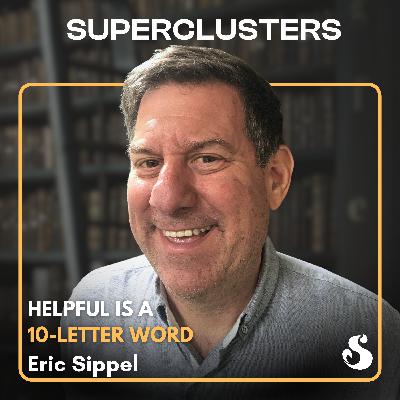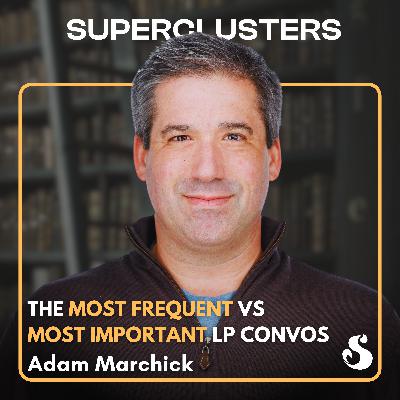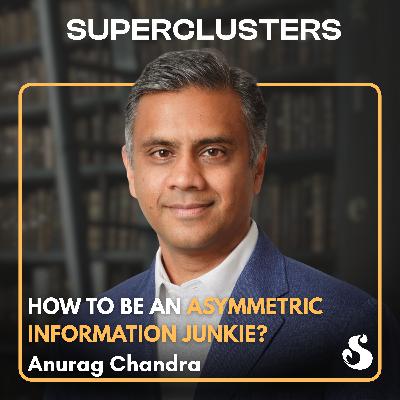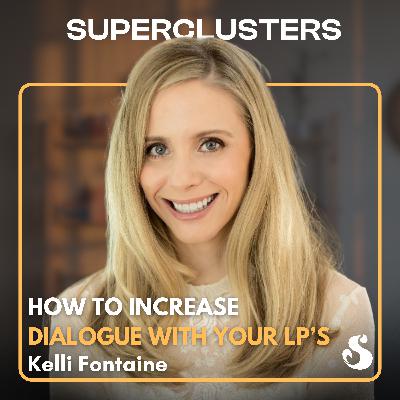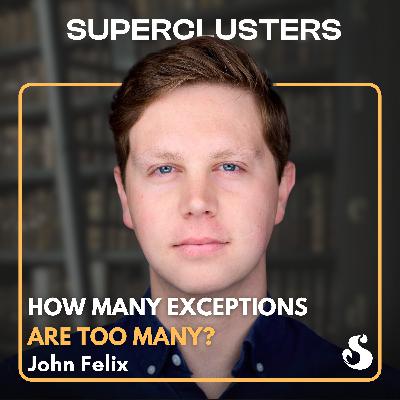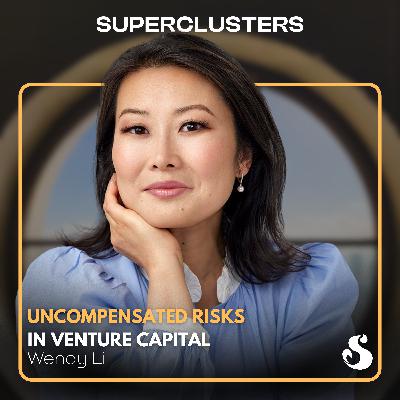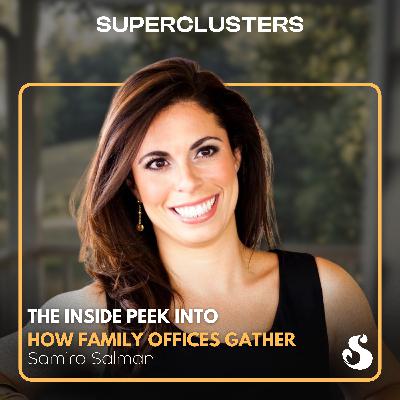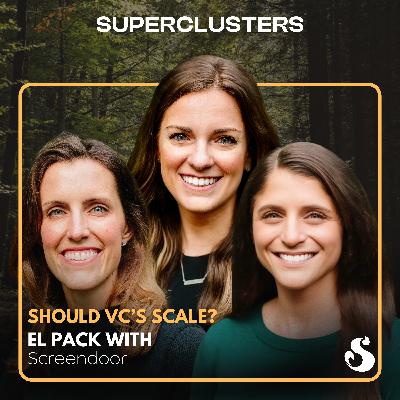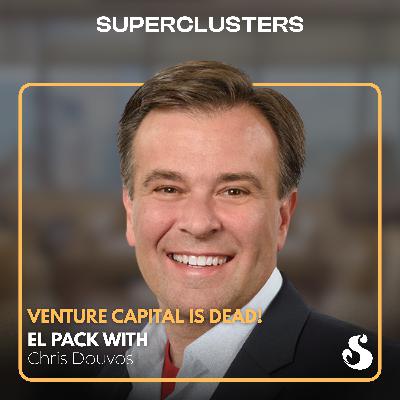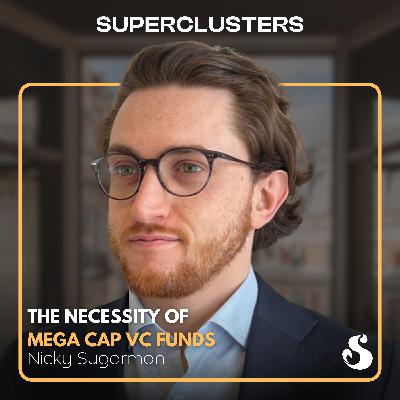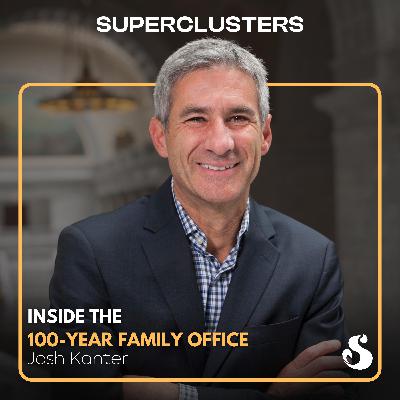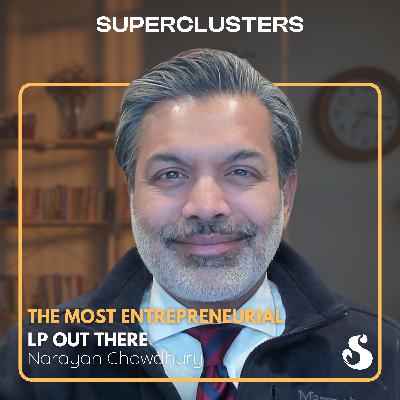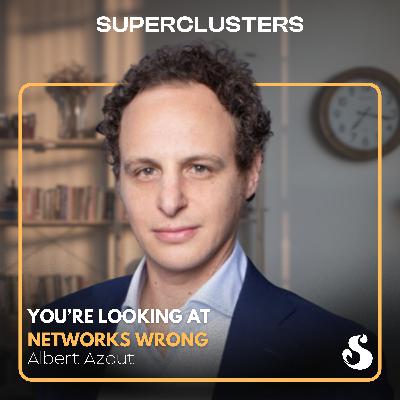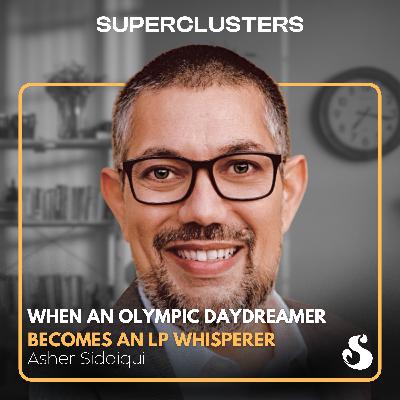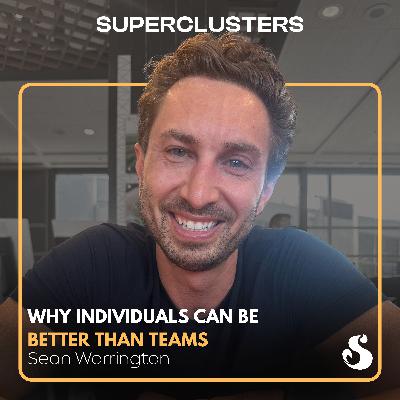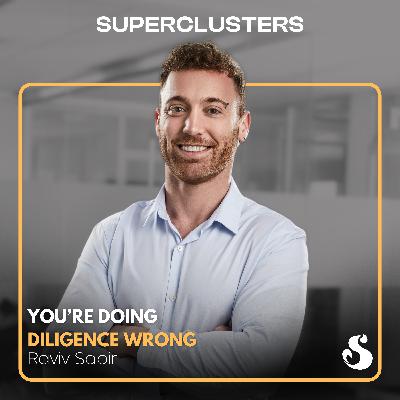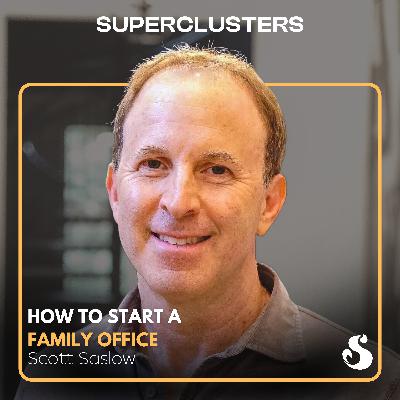Discover Superclusters - The Emerging LP Podcast
Superclusters - The Emerging LP Podcast

Superclusters - The Emerging LP Podcast
Author: Superclusters by David Zhou
Subscribed: 6Played: 181Subscribe
Share
© Superclusters by David Zhou
Description
Superclusters is a podcast designed to help the emerging LP think like an established LP allocating to venture capital as an asset class. Our goal is to answer one question: How do the world's wealthiest institutions and individuals pick VC firms to invest in?
64 Episodes
Reverse
“I hate checklists. I like outlines. I don’t like checklists. A checklist says ‘I have to have this, and then I’m good. An outline is ‘This is my starting point. These are the kinds of things I want to talk about or kinds of things I need to look at.” — Eric SippelEric Sippel currently runs his family office and is an active investor in and adviser to many venture capital, private equity, hedge and real estate funds. He is a member of the RAISE Global selection and steering committees (the premier emerging VC manager conference) and often speaks to emerging venture manager groups. Previously, Eric was the COO of Eastbourne Capital Management, a multi-billion dollar hedge fund firm, and a Partner at Shartsis, Friese & Ginsburg, where he was a nationally recognized hedge fund and venture capital lawyer. Eric serves on more than a dozen LPACs and has served on many for profit and non-profit boards.You can find Eric on his socials here:LinkedIn: https://www.linkedin.com/in/eric-sippel-976770/OUTLINE:[00:00] Intro[02:13] Why Eric's name on LinkedIn is lowercase?[02:44] Oceanside[04:18] Eric's grandfather and education in the family[07:06] Basketball[07:58] Eric's first venture fund investment in 1996[12:05] How does Eric invest below the minimum check size requirement?[14:51] How to decide your LP check size[17:47] Today, when does Eric invest in a new GP?[21:14] Time x capital 2x2 matrix[24:32] Tough conversations with Eric[27:00] The minimum viable value-add for LPs who write small checks[32:02] Eric's most impactful mistakes[35:11] How do you know if a GP is GOOD at adding value?[43:42] How many other funds in the same space does Eric look at before investing?[46:36] Breaking down Eric's deal flow[49:35] How many references does Eric do?[50:27] Who does Eric trust for LP references?[52:34] Other references for diligence[55:23] How does Eric approach a founder reference?[59:09] Biggest lessons from CIA training[1:05:16] Mike's Pizza[1:06:18] If everything were to change tomorrow, what would Eric photograph?Follow David Zhou for more Superclusters content:For podcast show notes: https://cupofzhou.com/superclustersFollow David Zhou's blog: https://cupofzhou.comFollow Superclusters on X: https://x.com/SuperclustersLP
Adam Marchick from Akkadian Ventures joins David on El Pack to answer your questions on how to build a venture capital fund. We bring on 3 GPs at VC funds to ask 3 different questions.Cocoa VC's Carmen Alfonso Rico asks what belief Adam held firmly for years but changed his mind recently on.Good Trouble Ventures' AJ Thomas asks about how GPs can better communicate risk to first-time LPs.1517 Fund's Danielle Strachman asks about the world view Adam has that shapes his investing thesis.Over the past twenty years, Adam Marchick has had unique experiences as a founder, general partner (GP), and limited partner (LP). Most recently, Adam managed the venture capital portfolio at Emory’s endowment, a $2 billion portfolio within the $10 billion endowment. Prior to Emory, Adam spent ten years building two companies, the most recent being Alpine.AI, which was acquired by Headspace. Simultaneously, Adam was a Sequoia Scout and built an angel portfolio of over 25 companies. Adam was a direct investor at Menlo Ventures and Bain Capital Ventures, sourcing and supporting companies including Carbonite (IPO), Rent The Runway (IPO), Rapid7 (IPO), Archer (M&A), and AeroScout (M&A). He started his career in engineering and product roles at Facebook, Oracle, and startups.You can find Adam on his socials here:X / Twitter: https://x.com/adammStanfordLinkedIn: https://www.linkedin.com/in/adammarchick/And huge thanks to Carmen, AJ, and Danielle for joining us on the show!OUTLINE:[00:00] Intro[01:22] The anatomy of a good story[02:26] The job of an annual summit[05:35] How often does VC change?[07:25] Narratives LPs are looking for at GPs' AGMs[08:25] "20% overall revenue growth in the portfolio is NOT exciting"[09:01] What founders talk about at an AGM[14:01] How does Adam spend time at an AGM[17:48] Enter Carmen and Cocoa VC[19:35] What did Adam change his mind about[21:09] How does an LP assess GP NPS?[22:16] Picking on-sheet references[24:33] The origin of Cocoa VC[26:08] What is Carmen's superpower?[27:09] What does Carmen want from her LPs?[29:09] The best answers to "what do you want from your LPs?"[31:29] Controversial decisions for the LPAC[33:39] Enter AJ and Good Trouble Ventures[34:25] Communicating risk to your LPs[35:58] What about to first-time LPs?[38:06] Where do first-time LPs come from?[39:50] What inspired AJ's question?[42:14] Is the convo different if LPs reach out vs you reach out?[43:45] The timing of LP conversations: most frequent vs most important[45:59] The trust equation[47:45] How to scale trust with LPs[51:35] How has GPs built trust with Adam?[53:29] How often does Adam keep in touch with his GPs?[56:06] Enter Danielle and 1517 Fund[58:38] What is Adam's mental model?[1:01:43] How does Adam define low entry prices?[1:03:25] Tracking trends as an LP[1:06:55] 80-20 portfolio construction[1:10:37] Would 1517's thesis 15 years ago count as market risk?[1:14:12] Adam's last piece of advice[1:15:46] Akkadian Ventures and RAISE Global[1:17:06] David's favorite moment from Adam's earlier episodeFollow David Zhou for more Superclusters content:For podcast show notes: https://cupofzhou.com/superclustersFollow David Zhou's blog: https://cupofzhou.comFollow Superclusters on X: https://x.com/SuperclustersLP
“There are a thousand ways to put lipstick on the pig and there are a thousand skeletons [in the closet]. I’ve only seen five or six because I’ve only seen three startup experiences. And so you need to deputize as many people as you possibly can to essentially triangulate.” — Anurag ChandraAnurag Chandra has spent over two decades in Silicon Valley as an investor, operator, and allocator. He has helped lead four venture capital funds, managing over $2.0B in aggregate AUM. Anurag has also been a senior executive in three enterprise technology startups, two of which were sold successfully to public companies. He is currently the CIO of a single-family office with an attached venture studio and a Trustee for the $4.5B San Jose Federated City Employees Retirement Fund, serving as Vice Chair of the Board, and Chair of its Investment and Joint Personnel Committees.You can find Anurag on his socials here:LinkedIn: https://www.linkedin.com/in/anchandra/X / Twitter: https://x.com/achandra41OUTLINE:[00:00] Intro[02:10] Why is what Anurag is wearing a walking contradiction?[06:08] The man without a home, but comfortable in everyone's home[10:17] The Stanford Review[12:55] The four @%#-holes of America[20:13] How did Anurag schedule regular coffee with Mark Stevens?[25:31] Mark Stevens' advice to Anurag about staying top of mind[26:42] How often should you email someone to stay in touch?[30:33] Why should you be an asymmetric information junkie?[34:21] Where should you find asymmetric information in VC?[36:02] The 'Oh Shit' board meeting[40:09] How San Jose Pension Plan views GPs[43:55] Defining the 'venture business'[49:09] Process drives repeatability[54:06] How San Jose Pension Plan built their investment process from scratch[58:43] What is a risk budget?[1:01:52] What did San Jose Pension Plan do about their risk budget?[1:05:05] The people who changed Anurag[1:11:10] Post-credit sceneFollow David Zhou for more Superclusters content:For podcast show notes: https://cupofzhou.com/superclustersFollow David Zhou's blog: https://cupofzhou.comFollow Superclusters on X: https://x.com/SuperclustersLP
Beezer Clarkson from Sapphire Partners joins David on El Pack to answer your questions on how to build a venture capital fund. We bring on four GPs at VC funds to ask four different questions.Precursor Ventures' Charles Hudson asks what is the one strongly held belief about emerging managers that she no longer believes is true.NextView Ventures' Stephanie Palmeri asks how much should an established firm evolve versus stick to their guns.Humanrace Capital's Suraj Mehta asks what the best way to build brand presence is.Rackhouse Venture Capital's Kevin Novak asks if you've deployed your capital faster than you expected, what's the best path forward with the remaining capital you have left?Beezer Clarkson leads Sapphire Partners‘ investments in venture funds domestically and internationally. Beezer began her career in financial services over 20 years ago at Morgan Stanley in its global infrastructure group. Since, she has held various direct and indirect venture investment roles, as well as operational roles in software business development at Hewlett Packard. Prior to joining Sapphire in 2012, Beezer managed the day-to-day operations of the Draper Fisher Jurvetson Global Network, which then had $7 billion under management across 16 venture funds worldwide.In 2016, Beezer led the launch of OpenLP, an effort to help foster greater understanding in the entrepreneur-to-LP tech ecosystem. Beezer earned a bachelor’s in government from Wesleyan University, where she served on the board of trustees and currently serves as an advisor to the Wesleyan Endowment Investment Committee. She is currently serving on the board of the NVCA and holds an MBA from Harvard Business School.You can find Beezer on her socials here.Twitter: https://twitter.com/beezer232LinkedIn: https://www.linkedin.com/in/elizabethclarkson/Check out Sapphire's latest breakdown on if venture is broken: https://www.linkedin.com/pulse/venture-broken-what-2000-priced-early-stage-rounds-tell-clarkson-sjvjc/And huge thanks to Charles, Suraj, Steph, and Kevin for joining us on the show!OUTLINE:[00:00] Intro[01:22] Where does Beezer's advice come from?[04:03] Charles and Precursor Ventures[04:47] What's something Beezer used to believe about seed stage venture that she no longer believes in[08:04] Why did Charles choose to bet on pre-seed companies?[10:21] What did LPs push back on when Charles was starting Precursor?[12:18] Definition of early stage investing today[14:38] Steph and NextView Ventures[18:13] When do you stick your knitting or move on from the past as an established firm?[30:48] Is venture investing in AI fundamentally different than investing in other types of companies?[32:52] Does competition for a deal mean you've already lost it?[36:09] Suraj and Humanrace Capital[36:54] How should emerging managers build their brand?[38:38] The audience most emerging managers don't focus on but should[40:39] How much does visible brand presence matter?[43:47] Useful or not: Media exposure in the data room[45:40] Backstreet boys[46:37] Kevin and Rackhouse Venture Capital[47:28] What Kevin is best known for[48:03] Updated fund modelling when you're ahead on your proposed deployment period[58:00] The typical questions Beezer gets on LPACs[1:03:22] Is venture broken?[1:06:41] David's favorite Beezer moment from Season 1Follow David Zhou for more Superclusters content:For podcast show notes: https://cupofzhou.com/superclustersFollow David Zhou's blog: https://cupofzhou.comFollow Superclusters on X: https://x.com/SuperclustersLP
Kelli Fontaine from Cendana Capital joins David on El Pack to answer your questions on how to build a venture capital fund. We bring on three GPs at VC funds to ask three different questions.The Council's Amber Illig asked what happens when a solo GP is incapacitated or passes away.Oceans Ventures' Steven Rosenblatt asked why most LPs follow the decision-making of other LPs.NeuCo Academy's Jonathan Ting asked what LPs think about GPs asking for help.From investing in great fund managers to data to investor relations, Kelli Fontaine is a partner at Cendana Capital, a fund of funds who’s solely focused on the best pre-seed and seed funds with over 2 billion under management and includes the likes of Forerunner, Founder Collective, Lerer Hippeau, Uncork, Susa Ventures and more. Kelli comes from the world of data, and has been a founder, marketing expert, and an advisor to founders since 2010.You can find Kelli on her socials here:X/Twitter: https://x.com/kells_bellsLinkedIn: https://www.linkedin.com/in/kellitrent/And huge thanks to Amber, Steven, and Jonathan for joining us on the show!OUTLINE:[00:00] Intro[01:26] Kelli's new data discoveries[04:32] How did Kelli underwrite a manager with no LinkedIn?[06:19] Is too much data ever a problem?[08:18] Vintage year benchmarking[09:49] Telltale signs on GPs' social profiles[10:57] Data Kelli wishes she could collect[15:59] Enter Amber and her new podcast[18:08] Amber's background and The Council[19:08] How does Amber define top companies?[24:25] How can a solo GP set the firm up well in case they're no longer there?[26:11] Kelli's number one fear with solo GPs[28:30] Best practices for generational transfers[32:28] Solo GPs and their future plans[36:51] Enter Steven and Oceans[42:38] Would Kelli ever include AI summaries as part of the get-to-know-someone phase?[44:18] Why do LPs follow other LP's decision-making?[48:43] What are the traits of an LP who is likely to have independent thinking?[51:16] Why don't LPs talk directly with founders?[57:59] Enter Jonathan and NeuCo Academy[1:00:05] Is Kelli seeing more secondaries firms?[1:01:56] How often should GPs lean on LPs for help?[1:07:22] Are most LPs helpful?[1:12:21] What kinds of questions does Kelli get from her own GPs?[1:15:39] Kelli's last piece of adviceFollow David Zhou for more Superclusters content:For podcast show notes: https://cupofzhou.com/superclustersFollow David Zhou's blog: https://cupofzhou.comFollow Superclusters on X: https://x.com/SuperclustersLP
Pattern Ventures' John Felix joins David on El Pack to answer your questions on how to build a venture capital fund. We bring on three GPs at VC funds to ask three different questions.Atria Ventures' Chris Leiter asked about the common mistakes LPs make when underwriting solo GPs.Garuda Ventures' Arpan Punyani asked how quickly do most LPs get to conviction. First 10 minutes? First meeting?Geek Ventures' Ihar Mahaniok asked how LPs evaluate Fund IIs when the Fund I has no distributions.John Felix is a General Partner and Head of Research at Pattern Ventures, a specialized fund of funds focused on backing the best small venture managers. Prior to Pattern, John served as the Head of Emerging Managers at Allocate where he was an early employee and helped to launch Allocate's emerging manager platform. Prior to joining Allocate, John worked at Bowdoin College's Office of Investments, helping to invest the $2.8 billion endowment across all asset classes, focusing on venture capital. Prior to Bowdoin, John worked at Edgehill Endowment Partners, a $2 billion boutique OCIO. At Edgehill, John was responsible for building out the firm's venture capital portfolio, sourcing and leading all venture fund commitments. John started his career at Washington University's Investment Management Company as a member of the small investment team responsible for managing the university's now $13 billion endowment. John graduated from Washington University in St. Louis with a BSBA in Finance and Entrepreneurship.You can find John on his socials here:LinkedIn: https://www.linkedin.com/in/johnfelix12/Twitter: https://x.com/johnfelix123And huge thanks to Chris, Arpan, and Ihar for joining us on the show!OUTLINE:[00:00] Intro[02:20] What's changed for John since our last recording?[04:08] What is Pattern Ventures?[06:22] Why is Pattern's cutoff for funds they're interested in at $50M?[07:32] How does John define noise?[09:34] Do non-sexy industries require larger seed funds?[11:36] How does think about overlap in the underlying startup portfolio?[15:22] Enter Chris and Atria Ventures[18:03] Should solo GPs scale past themselves?[24:14] Partnerships have more risk than solo GPs[26:10] How does John think about spinouts from large VC firms?[27:53] The psychology of being a partner at a big firm versus your own[30:38] Enter Arpan and Garuda Ventures[31:26] Geoguessr[32:52] Garuda's podcast, Brick by Brick[34:52] How quickly do LPs know they intuitively want to invest in a GP?[38:02] The analogy to what GPs do to founders[43:50] There are many ways to make money[44:57] Quantifying intuition as an investor[49:12] Enter Ihar and Geek Ventures[49:36] How do LPs evaluate Fund IIs when Fund I has no DPI?[53:01] How do you know if a GP did what they said they were going to do?[54:47] What if the key value driver is off-thesis, but everything else is on-thesis?[56:21] Is signing 1 uncapped SAFE per fund reasonable?[57:14] What is the allowable percentage of exceptions in a fund?[1:01:32] Good vs bad exceptions[1:06:06] Reminders that we are in the good old days[1:07:31] John's last piece of advice to new allocators[1:09:00] David's favorite moment from John's last episodeFollow David Zhou for more Superclusters content:For podcast show notes: https://cupofzhou.com/superclustersFollow David Zhou's blog: https://cupofzhou.comFollow Superclusters on X: https://x.com/SuperclustersLP
“It’s not the probability; it’s the consequence. It’s not the probability when something goes wrong. It’s the consequence when it goes wrong.” – Wendy LiWendy Li is the co-founder and Chief Investment Officer at Ivy Invest, a fintech investment platform bringing an endowment-style portfolio to everyday investors.Before Ivy Invest, Wendy was Managing Director of Investments at the Mother Cabrini Health Foundation, where she built the Investment Office from the ground up and managed a $4 billion portfolio. Prior to Mother Cabrini Health Foundation, Wendy was Director of Investments at UJA-Federation, investing across a broad range of asset classes. Wendy began her career in the Investment Office at the Metropolitan Museum of Art. She has a Bachelor of Arts degree from Columbia University and is a CFA charterholder.You can find Wendy on her socials here:LinkedIn: https://www.linkedin.com/in/wendy-li-cfa/X / Twitter: https://x.com/askwendyliOUTLINE:[00:00] Intro[02:29] Wendy's family's history with Columbia University[07:55] The importance of understanding family history[11:09] Why Wendy chose to work at The Met[15:16] How did Wendy know in the interview that Lauren would be her mentor?[19:18] Specialist vs generalist in 2006[22:58] Pros and cons of using AI as an LP[29:02] The 80-20 rule for how an LP thinks[29:29] The one mistake EVERY SINGLE LP makes[33:27] What is the Takahashi-Alexander model?[39:38] Who do you learn from when your LP institution is so small?[41:22] The wisdom of an open-sourced LP reading list[45:34] What is headline risk?[47:09] What does 'uncompensated risk' mean?[50:20] Why now for 'endowment-in-a-box'[55:07] Wendy's proudest dish from her mom's recipe book[57:09] Wendy's last piece of adviceFollow David Zhou for more Superclusters content:For podcast show notes: https://cupofzhou.com/superclustersFollow David Zhou's blog: https://cupofzhou.comFollow Superclusters on X: https://x.com/SuperclustersLP
“The very first thing everybody has to do is give themselves permission to lean into what they are interested in and what does it for them and what they understand and what they have an affinity for, regardless of what everybody else says you should be doing.” – Samira SalmanSamira Salman is a generational force—a rare blend of financier, strategist, and connector—revered for her ability to move capital, catalyze ventures, and cultivate the kinds of high-trust relationships that shape industries and define legacies. With over $5.5 billion in closed transactions spanning multiple asset classes, she is not merely a dealmaker—she is a trusted consigliere to some of the world’s most sophisticated families, investors, and visionaries.Samira is the Founder & CEO of Salman Solutions, a bespoke advisory firm, and the visionary behind Collaboration Circle, an invitation-only global ecosystem recognized by Fortune Magazine as the premier “by families, for families” platform—curating aligned capital, deal flow, and meaningful connection across generations of wealth. She also serves as Chief Operating Officer of a private single-family office, overseeing a portfolio that blends venture capital, direct investments, and multi-generational governance.Educated as a mergers and acquisitions tax attorney, Samira’s early career at Arthur Andersen, Deloitte, KPMG, and Shell Oil laid the foundation for her structural brilliance and financial fluency. She holds an LL.M. in Taxation, a JD, and a BS in International Trade and Finance—with a minor in Economics. Her legal acumen, combined with a deep intuition for human behavior, gives her a unique edge in structuring elegant, effective solutions that drive growth, mitigate risk, and unlock hidden value.Her work spans advisory mandates, capital formation, co-investment syndication, family office strategy, and the orchestration of transformational events for UHNW families and industry trailblazers.A passionate advocate for women’s economic empowerment, arts and culture, and global impact, Samira has served as an Honorary Advisor to the United Nations for Social Impact Projects and the NGO Committee on Sustainable Development. She has held board roles with numerous arts, education, healthcare, and professional institutions including the Houston Ballet, Center for Contemporary Craft, and Fresh Arts.You can find Samira on her socials here:LinkedIn: https://www.linkedin.com/in/samirasalman/X / Twitter: https://x.com/samira_salmanOUTLINE:[00:00] Intro[02:27] How did Samira find herself at TASIS?[04:17] How did TASIS feel when she first arrived?[07:27] From tax lawyer to family offices[09:55] How did Samira decide to quit being a lawyer?[17:12] Why did Samira want to be a tax lawyer?[19:44] Journaling[22:39] The blessing of a lawyer brain[25:19] The Oprah episode that changed it all[29:45] How did Salman Solutions start?[33:28] Samira's first interaction with family offices[36:43] Show and tell with Samira's journals and pens[41:27] What did Samira mean that most family offices fall short of raising their own capital?[42:54] What is the common family office hero arc into VC?[44:05] Family office trends that Samira's seen[47:17] The starting point for families interested in VC[50:13] Advice to a friend who wants to invest in VC[53:31] Book, podcast and conference recommendations[55:42] How does one qualify for Collaboration Circle?[56:21] Content recommendations, continued[59:57] How Collaboration Circle started[1:06:59] The 3 pieces of Collaboration Circle[1:09:49] Community economic models and human nature misalignment[1:12:43] How to create safe environments[1:18:02] The Dior bag tradition[1:21:20] Reminders that we're in the good old daysFollow David Zhou for more Superclusters content:For podcast show notes: https://cupofzhou.com/superclustersFollow David Zhou's blog: https://cupofzhou.comFollow Superclusters on X: https://x.com/SuperclustersLP
The entire Screendoor team joins David on El Pack to answer your questions on how to build a venture capital fund. We bring on three GPs at VC funds to ask three different questions.Kyber Knight Capital's Linus Liang asked about why LPs choose to bet on new managers as opposed to investing in more established funds.NOMO Ventures' Kate Rohacz asked about what parts of venture do LPs think is most opaque.Articulate's Helen Min asked if every emerging manager should scale into a larger firm.The Screendoor team is a powerhouse of experienced LPs, bringing together institutional investment experience that spans over a decade. Lisa Cawley, Layne Johnson, and Jamie Rhode have each built institutional venture programs within innovative family offices, financial institutions, and pensions. They have invested in venture capital across stages, sectors, and geographies, and in particular are known as a go-to for emerging managers.Lisa Cawley is the Managing Director of Screendoor. Previously, Lisa worked with a private multi-billion-dollar global investment firm and Ernst & Young.You can find Lisa on her socials here:LinkedIn: https://www.linkedin.com/in/31mml/Layne Johnson is a Partner at Screendoor. Previously, she led the Venture & Growth Equity manager selection effort at the Teacher Retirement System of Texas ("TRS"). She had previously been at Goldman Sachs.You can find Layne on her socials here:LinkedIn: https://www.linkedin.com/in/layne-johnson-4b71b571/Jamie Rhode is a Partner at Screendoor. She previously spent 8 years at Verdis Investment Management, an institutional single family office that manages capital for generations 7 through 10.You can find Jamie on her socials here:Twitter: https://twitter.com/DurationFXLinkedIn: https://www.linkedin.com/in/jerrcfa/And huge thank you for Linus, Kate, and Helen for jumping on the show.OUTLINE:[00:00] Intro[05:58] Enter Linus and Kyber Knight Capital[10:06] Why take the risk of betting on an emerging manager?[18:40] The types of pushback Linus got when he was fundraising[19:47] The incentives of an LP when investing in VC[21:49] How do GPs ask LPs how they're compensated?[24:47] Enter Kate and NOMO Ventures[28:31] What part of venture is most opaque?[38:18] The things venture LPs look at beyond the metrics[43:47] "Bad" advice from LPs[46:27] Enter Helen[46:48] Helen's new podcast, Great Chat[49:34] What is Articulate?[52:43] Should emerging funds scale?[1:00:47] How often do GPs say they want to scale[1:03:03] Layne's advice for GPs[1:03:39] Jamie's advice for LPs[1:04:55] Lisa's advice for LPs and GPs[1:07:35] David's favorite moment from Jamie's episode[1:09:53] David's favorite moment from Lisa's episodeFollow David Zhou for more Superclusters content:For podcast show notes: https://cupofzhou.com/superclustersFollow David Zhou's blog: https://cupofzhou.comFollow Superclusters on X: https://x.com/SuperclustersLP
Ahoy Capital's founder, Chris Douvos, joins David on El Pack to answer your questions on how to build a venture capital fund. We bring on three GPs at VC funds to ask three different questions.Pachamama Ventures' Karen Sheffield asked about how GPs should think about when and how to sell secondaries.Mangusta Capital's Kevin Jiang asked about how GPs should think about staying top of mind with LPs between fundraises.Stellar Ventures' David Anderman asked Chris about GPs who start to specialize in different stages of investment compared to their previous funds.Chris Douvos founded Ahoy Capital in 2018 to build an intentionally right-sized firm that could pursue investment excellence while prizing a spirit of partnership with all of its constituencies. A pioneering investor in the micro-VC movement, Chris has been a fixture in venture capital for nearly two decades. Prior to Ahoy Capital, Chris spearheaded investment efforts at Venture Investment Associates, and The Investment Fund for Foundations. He learned the craft of illiquid investing at Princeton University’s endowment. Chris earned his B.A. with Distinction from Yale College in 1994 and an M.B.A. from Yale School of Management in 2001.You can find Chris on his socials here:Twitter: https://twitter.com/cdouvosLinkedIn: https://www.linkedin.com/in/chrisdouvos/And huge thank you for Karen, Kevin, and David for jumping on the show.OUTLINE:[00:00] Intro[01:03] The facade of tough times[05:03] The last time Chris hugged someone[06:53] The art (and science?) of a good hug[08:32] How does Chris start his quarterly letters?[10:35] Quotes, writing, and AI[15:13] Venture is dead. Why?[17:33] But... why is venture still exciting?[21:13] Enter Karen Sheffield[21:48] The never-to-be-aired episode with Chris and Beezer[22:55] Karen and Pachamama Ventures[24:19] The third iteration of climate tech vocabulary[26:55] How should GPs think about secondaries?[33:53] Where can GPs go to learn more about when to sell?[36:53] Are secondary transactions actually happening or is it bluff?[38:44] "Entrepreneurship is like a gas, hottest when compressed"[42:26] Enter Kevin Jiang and Mangusta Capital[44:21] The significance of the mongoose[46:36] How do LPs like to stay updated on a GP's progress?[59:35] How does a GP show an LP they're in it for the long run?[1:03:57] David's Anderman part of the Superclusters story[1:05:41] David Anderman's gripe about the name Boom[1:06:31] Enter David Anderman and Stellar Ventures[1:10:21] What do LPs think of GPs expanding their thesis for later-stage rounds?[1:21:43] Why not invest all of your private portfolio in buyout funds[1:25:48] Good answers to why didn't things work out[1:28:13] Chris' one last piece of advice[1:35:18] My favorite clip from Chris' first episode on SuperclustersFollow David Zhou for more Superclusters content:For podcast show notes: https://cupofzhou.com/superclustersFollow David Zhou's blog: https://cupofzhou.comFollow Superclusters on X: https://x.com/SuperclustersLP
“All these sorts of things that are quite frankly boring, monotonous, tedious, unglamorous, or not sexy, they are the sorts of things that can make or break whether a fund is good or not. Because you can be a great investor, but if the experience of the LP is awful, it doesn’t matter how good the fund is."Ultimately, somebody’s got to deal with you. They’ve probably got people to report to themselves. If you’re giving them a headache because you can’t do the aspects of it, then that’s where you’re going to lose LP appetite. That can tell apart who sees themselves as an investor and who sees themselves as a fund manager.” – Nicky SugarmanNicky Sugarman is a highly sought after advisor to both family offices and venture investors. Prior, he was also a partner at Stanhope, a $40B multi family office, running their private equity and venture practices. Moreover he, along with Jonathan Hollis at Mountside Ventures, launched the program for the emerging manager to learn the institutional lens.You can find Nicky on his socials here:LinkedIn: https://www.linkedin.com/in/nicky-sugarman-98188636/X / Twitter: https://x.com/NickySugarmanOUTLINE:[00:00] Intro[02:36] Nicky and LEGOs[05:24] LEGOs or cars[05:59] What Nicky's dad taught Nicky[06:45] Why does the world need another fund accelerator?[08:35] The curriculum at the fund accelerator[10:21] The difference between a fund manager and investor[12:04] Thoughtful examples to the previous question[14:12] Diligence vs stalking[16:29] Nicky's most used app[17:28] Why are mega cap funds necessary?[21:21] Why VC becoming PE is inevitable[24:48] The best types of LPs for multi-asset portfolios[26:33] Why do LPs speak in IRR, not multiples?[29:06] Understanding a GP's valuation policy[33:46] Communicating news from GPs to LPs[36:03] How does Nicky know if a GP is in for the long haul?[38:33] Nicky's favorite answers to how a firm scales[39:48] First critical hires at a VC firm[40:45] Ideal traits of a VC COO[41:38] How much should a good COO get paid?[42:50] Should people get paid at the 50th percentile?[45:28] How much should GPs pay themselves?[48:30] The one what-if that keeps Nicky up at nightFollow David Zhou for more Superclusters content:For podcast show notes: https://cupofzhou.com/superclustersFollow David Zhou's blog: https://cupofzhou.comFollow Superclusters on X: https://x.com/SuperclustersLP
“Buying junk at a discount is still junk.” – Abe FinkelsteinAbe Finkelstein, Managing Partner at Vintage, has been leading fund, secondary, and growth stage investments focused on fintech, gaming, and SMB software, among others, leading growth stage and secondary investments for Vintage in companies like Monday.com, Minute Media, Payoneer, MoonActive and Honeybook.Prior to joining Vintage in 2003, Abe was an equity analyst with Goldman Sachs, covering Israel-based technology companies in a wide variety of sectors, including software, telecom equipment, networking, semiconductors, and satellite communications. While at Goldman Sachs, Abe, and theIsrael team were highly ranked by both Thomson Extel and Institutional Investor.Prior to Goldman Sachs, Abe was Vice-President at U.S. Bancorp Piper Jaffray, where he helped launch and led the firm’s Israel technology shares institutional sales effort. Before joining Piper, he was an Associate at Brown Brothers Harriman, covering the enterprise software and internet sectors. Abe began his career at Josephthal, Lyon, and Ross, joining one of the first research teams focused exclusively on Israel-based companies.Abe graduated Magna Cum Laude from the Wharton School at the University of Pennsylvania with a BS in Economics and a concentration in Finance.Vintage Investment Partners is a global venture platform managing ~$4 billion across venture Fund of Funds, Secondary Funds, and Growth-Stage Funds focused on venture in the U.S., Europe, Israel, and Canada. Vintage is invested in many of the world's leading venture funds and growth-stage tech startups striving to make a lasting impact on the world and has exposure directly and indirectly to over 6,000 technology companies.You can find Abe on his socials here:LinkedIn: https://www.linkedin.com/in/abe-finkelstein/OUTLINE:[00:00] Intro[03:18] Abe's first investment[06:19] The definition of quality secondaries in 2003[09:37] How did Abe know there would be capital to follow?[15:45] Valuation methodology in the 2000s[22:28] Minimum meaningful ownership for secondaries[26:17] Why did founders take Vintage's call in Fund I?[30:41] The old-school way of tracking deal memos[32:06] Our job is to play the optimist[32:31] The headwinds of raising Vintage Fund I[36:32] Moving Vintage's physical books to the cloud[39:06] How does Abe assign discounts to secondaries?[42:23] Proactive outreach vs reactive deal flow[46:18] What does Vintage do to stay top of mind?[49:49] What's changed in the secondaries market since 2000?[55:32] Founder paranoia[57:56] What does Abe want his legacy look like?Follow David Zhou for more Superclusters content:For podcast show notes: https://cupofzhou.com/superclustersFollow David Zhou's blog: https://cupofzhou.comFollow Superclusters on X: https://x.com/SuperclustersLP
“The more you can create that context in the family owner's manual, the more important it is and the more it is NOT the ‘in-case-of-emergency’ file. Because the in-case-of-emergency file is going to say I’m an LP in Fund VII from so-and-so and my withdrawal rights are such and such. Or here’s the document. You go figure out what my withdrawal rights are, if I have any.” The owner's manual teaches future generations what to prioritize and why. – Josh KanterJosh Kanter is the family office principal at Josh Kanter Wealth Advisory Services. He is also the founder & CEO at leafplanner, a comprehensive solution on planning for the 100-year time horizon for a family office, birthed out of his own need with his own family of creating an everlasting institution.After decades as a lawyer, he went on to focus on his family business where he also currently serves as President of Chicago Financial, Inc., a single family office overseeing a complex organization of trusts, investment and philanthropic entities for a multi-branch and multi-generational family.You can find Josh on his socials here:LinkedIn: https://www.linkedin.com/in/joshua-kanter/OUTLINE:[00:00] Intro[04:01] Art, sculptures and Jun Kaneko[12:30] The inception of Walnut Capital Corp[15:36] How Josh defines creativity[17:03] Creating the "freedom trust"[17:56] Where did the name leafplanner come from?[20:03] How did Josh get involved in the family venture business?[23:22] Top lessons from being startups' legal advisor[25:48] Lessons as an investor and LP[27:57] Investing in America's biggest fraud[30:01] The origin of leafplanner[38:15] How do you start a family owner's manual[40:03] The importance of prioritization and context in the manual[45:35] How do you make a owner's manual searchable?[49:50] The five kinds of capital (intellectual, human, social, financial, spiritual)[53:15] What is the role of luck in Josh's life?[54:31] Josh's primary vice when saying no[56:51] Post-credit sceneFollow David Zhou for more Superclusters content:For podcast show notes: https://cupofzhou.com/superclustersFollow David Zhou's blog: https://cupofzhou.comFollow Superclusters on X: https://x.com/SuperclustersLP
“This is one of the big issues of a bunch of data work on venture is insights from some periods don’t mean anything or are not translatable to present time. It’s really frustrating. So we go back to people, reputations, and experience.” – Narayan ChowdhuryRitujoy Narayan Chowdhury is the co-founder and Managing Director at Franklin Park, where he focuses on private equity investment opportunities, monitoring clients’ portfolios and conducting industry research. He also plays a key role in the development and implementation of Franklin Park’s technology platform, and regularly interacts with clients on investment and portfolio matters.Prior to Franklin Park, Narayan worked with Hamilton Lane and Public Financial Management. He is a CFA Charterholder and a member of the CFA Institute. Narayan received a B.A. in Mathematics and Economics from Bucknell University.You can find Narayan on his socials here:LinkedIn: https://www.linkedin.com/in/narayan-chowdhury/X / Twitter: https://x.com/RNC76OUTLINE:[00:00] Intro[02:27] Why my parents moved to the US[03:43] Narayan's dad[08:54] The friction that Narayan has with his team[11:59] Why current analyst training creates bad habits[15:00] What Narayan does when his family goes to bed[16:37] When did Narayan first start playing with code?[17:34] Narayan's entrepreneurial origins and how much he got paid[19:54] "Never sit alone at lunch"[22:54] The Mike Maples story[25:48] When Narayan realized VC is very different from PE[30:05] The difference between underwriting VC and buyout[34:28] What do you do when you've pigeonholed yourself in one industry?[37:02] How do you know if a GP is a core part of an alumni network?[38:32] A 2025 micro trend of misleading operating metrics[43:40] How has VC changed in the past few decades?[53:58] What do most people underappreciate about hockey?Follow David Zhou for more Superclusters content:For podcast show notes: https://cupofzhou.com/superclustersFollow David Zhou's blog: https://cupofzhou.comFollow Superclusters on X: https://x.com/SuperclustersLP
“The bigger you get, the more established you get, the more underwriting emphasis goes into how this team operates as a structure rather than is there a star?” – Matt CurtoloMatt Curtolo, CAIA is a seasoned private markets investor and allocator with over two decades of experience at leading financial institutions. Throughout his career, he has been directly responsible for allocating more than $6 billion in commitments to private market investments and maintains relationships with hundreds of general partner relationships across the full spectrum of private capital strategies. Most recently, as Head of Investments at Allocate, a venture-backed fintech startup. Matt built the investment capability from the ground up, broadening access to top-tier venture capital opportunities for the private wealth market. Prior to this, he served as a senior leader at MetLife, serving on the investment committee, co-managing their global alternatives portfolio and leading the firm's US Buyout portfolio. Earlier in his career, Matt led all private equity activities as Head of Private Equity at Hirtle Callaghan, a large independent outsourced Chief Investment Officer (oCIO). Matt's foundational experience was gained at Hamilton Lane during its early growth phase, before it became the world's preeminent private markets allocator, in research, investment and client-facing roles. Matt currently holds several advisory positions that span start-ups, asset management firms and fund of funds. He also manages his own advice practice, providing GPs with strategic guidance on strategy, fundraising and investor relations.You can find Matt on his socials here:LinkedIn: https://www.linkedin.com/in/matt-curtolo-caia/OUTLINE:[00:00] Intro[04:24] What town did Matt grow up in?[04:37] Why is that town significant from a sociological perspective?[08:43] Why is Matt fascinated with the Detroit Lions?[11:08] What is it like cheering for the underdog?[13:02] How does Matt break down deal attribution in partnerships?[18:04] GPs' karmic bank account[21:29] What is the kindest thing anyone's done for Matt?[23:24] How did tennis enter Matt's life?[26:35] Historical examples of VC management/leadership structures[29:33] Underwriting track record between senior and junior investors[32:23] How Matt approaches diligence after reading the data room[39:30] How do you know when you've asked enough questions?[42:37] The three classes of questions for GPs that influence investment decisions[45:34] Remote culture[50:16] Cadence of in-person gatherings in remote teams[52:48] The two (and a half) types of conversations to always host in-person[58:37] The last great idea Matt had on a walk[1:02:05] The legacy Matt wants to leave behind[1:04:37] Post-credit sceneFollow David Zhou for more Superclusters content:For podcast show notes: https://cupofzhou.com/superclustersFollow David Zhou's blog: https://cupofzhou.comFollow Superclusters on X: https://x.com/SuperclustersLP
“Networks are more persistent than performance.” – Albert AzoutAlbert Azout is the Co-Founder and Managing Partner of Level VC, a technology investment firm built on software and data science and invests in both entrepreneurs and venture capital managers, including the likes of Air Street Capital, Emergent Ventures and Work-Bench, just to name a few. Prior to Level, Albert has been a serial founder, starting analytics businesses and even a social media company before Facebook.You can find Albert on his socials here:LinkedIn: https://www.linkedin.com/in/albertazout/Substack: http://albertazout.substack.com/OUTLINE:[00:00] Intro[02:36] The origin of Albert's blog[04:45] How did Albert first start coding?[07:43] Albert's interest in networks[13:10] Entrepreneurship around Albert[16:27] What is collaborative filtering?[22:18] How complexity economics affect the networks of VCs?[27:14] Fear and greed regimes[28:51] Telltale signs that inform the kind of regime you're in[30:31] Why it's the wrong time to be investing in defense tech[34:53] What are most LPs missing about GP networks?[37:31] How is Level VC looking at networks differently?[44:42] Archetypes of GPs that Albert likes[46:43] The 3 advantages GPs need to have[55:02] How does Albert balance over- vs under-diligencing?[57:15] Albert's view on luck[57:47] Albert the "consciousness expert"Follow David Zhou for more Superclusters content:For podcast show notes: https://cupofzhou.com/superclustersFollow David Zhou's blog: https://cupofzhou.comFollow Superclusters on X: https://x.com/SuperclustersLP
"What I hear from LPs is that the market is important. And of course, the market IS important. And I think that that’s true. But if you truly believe in venture as a purist, then all of it is irrelevant because at any point in time, someone will come and have this unique insight. And the timing is against them. The world is against them. They’re in the wrong place at the wrong time, and yet, they have this unique insight at this point in time. They have the opportunity to invest at this point in time. And so, just because the timing is wrong doesn’t mean you shouldn’t be backing them. Because they might be right. And you might be missing out on the best opportunity in your lifetime."Asher Siddiqui is a global tech investor, M&A dealmaker, and venture fund builder with over 25 years of hands-on experience across venture capital, entrepreneurship, and more than $15B in executed M&A transactions.He began his career as a software engineer and entrepreneur in the US and UK before spending a decade leading M&A and corporate venture at Etisalat Group (now e& Group), one of the world’s largest listed TMT investment groups. There, he led acquisitions, exits, and strategic transactions across multiple continents.In 2016, Asher joined the global leadership team at 500 Startups in San Francisco, helping scale the platform to $2B+ AUM, with a portfolio that includes 35+ unicorns and 160+ centaurs.Since then, he has helped launch and scale several institutional VC firms—including Race Capital, Lumikai, Sukna Ventures, Zayn VC, and Humanrace Capital—and serves on the advisory boards of funds such as FootPrint Coalition Ventures, Merus Capital, and The Treasury.To date, Asher has made 100+ venture investments (both direct and LP), raised hundreds of millions in LP commitments, mentored hundreds of emerging VC managers globally, and advised countless founders.You can find Asher on his socials here:LinkedIn: https://www.linkedin.com/in/ashersiddiqui/X / Twitter: https://x.com/ashercdkeyOUTLINE:[00:00] Intro[03:36] Why doesn't Asher like the saying 'The sky's the limit?'[07:20] The launch of CNBC Africa[15:25] How do two competing personalities create one of the largest media empires in the world?[17:39] Combining vision and execution[21:22] Asher's framework for executing on a vision[31:00] Why Asher was the youngest Global Head of M&A of a major telecom business[43:57] What sets a great investor apart from a great fund manager[45:27] Roleplaying a GP thinking about secondaries[51:44] What do most LPs underestimate and overestimate[58:24] Most telling predictors of outperforming GPs[1:07:13] The best wine and food for each situation[1:12:25] Asher's Vinod Khosla storyFollow David Zhou for more Superclusters content:For podcast show notes: https://cupofzhou.com/superclustersFollow David Zhou's blog: https://cupofzhou.comFollow Superclusters on X: https://x.com/SuperclustersLP
“Some of the best investments, as we look back in history, were never obvious at the moment the investments were made. You may not have to be contrarian, but you have to have a variant perception than the rest of the market. Maybe you saw the team differently. You saw the space growing differently. That, to us, inherently, is a single decision maker-type thought process at the earliest stage, when it’s less about metrics. It’s more about how you evaluate the talent and the team.” – Sean WarringtonSean Warrington leads private market investing at Gresham Partners, a $10 billion multi-family office based in Chicago. Known for being a transparent and user-friendly LP, he and the Gresham team aim to simplify the fundraising process — offering single-check investments, a streamlined diligence process, and prompt, candid feedback to GPs.You can find Sean on his socials here:X / Twitter: https://x.com/srwarringtonLinkedIn: https://www.linkedin.com/in/srwarrington/OUTLINE:[00:00] Intro[03:29] Who is Jeff French?[05:26] The metrics for success for a junior LP[07:20] The 3 chapters of Sean's evolution as an LP[11:05] Sean's first investment[14:44] When GPs put LPs on strict timelines[16:53] One archetype of GP that Sean is excited about[19:37] What it looks like to be thoughtful when growing AUM[23:16] What most LPs don't understand about solo GPs[25:58] What happens when a GP leaves a partnership[27:33] The definition of LP/GP alignment[30:47] Reference archetypes and how to find them[35:32] How to manage bandwidths in a small team[38:58] Frameworks for taking calls[42:26] How much does Sean travel?[43:25] Why coffee chats don't work[45:30] What Sean's changed his mind on about investing[47:12] What did Jason Kelce's retirement mean to Sean?[49:36] Post-credit sceneFollow David Zhou for more Superclusters content:For podcast show notes: https://cupofzhou.com/superclustersFollow David Zhou's blog: https://cupofzhou.comFollow Superclusters on X: https://x.com/SuperclustersLP
“Most [references] will not give a negative reference about someone, but you will have to understand and listen between the lines. What is a good or a bad reference? They might say, ‘I really like him as a person. He’s really nice.’ But this is a person that’s worked together with you in a team, and you’re not saying he’s great with founders or finding the best deals. Maybe he’s not that good.” – Raviv SapirRaviv Sapir is an early-stage investor at Vinthera, a fund of funds and venture firm with a hybrid strategy that combines VC fund investments with direct startup investments. With a background in tech and finance, an MBA from HEC Paris, and years of experience mentoring startups and supporting LPs, Raviv brings a sharp eye for high-conviction opportunities and a practical approach to venture. He previously held product roles at leading Israeli startups and served in a technological unit within the Israeli Defense Forces. His work across geographies, sectors, and investment stages gives him a uniquely holistic and global perspective on the venture ecosystem.You can find Raviv on his socials here:LinkedIn: https://www.linkedin.com/in/raviv-sapir/OUTLINE:[00:00] Intro[03:31] Swimming since he was 7[09:49] Breaking down each GP's track record and dynamics in a partnership[11:25] Telltale signs that a partnership will last[12:50] An example of questionable GP dynamics[21:45] Virtual partnerships[25:43] GPs working out of coworking spaces[28:30] Commonly held LP assumptions[32:16] A big red flag GPs often say[34:27] What does Raviv look for during reference calls?[39:41] How does the diligence change for a Fund I/II vs Fund III/IV?[42:26] Qualitative traits Raviv likes to see in a Fund I GP vs Fund II+ GP[44:04] Ideal cadence of reporting and LP/GP touchpoints[46:03] Role of the LPAC across different funds[48:47] Diligence as a function of check size[54:37] What's Raviv's favorite episode of Venture Unlocked?[56:23] The podcasts that Raviv listens toFollow David Zhou for more Superclusters content:For podcast show notes: https://cupofzhou.com/superclustersFollow David Zhou's blog: https://cupofzhou.comFollow Superclusters on X: https://x.com/SuperclustersLP
“A lot of family office principals, unless they’ve worked in finance – they should not be solely making the decision on which RIA to hire.” – Scott SaslowScott Saslow is the founder, CEO, and family office principal for ONE WORLD. He's also the founder and CEO of The Institute of Executive Development, as well as the author of Building a Sustainable Family Office: An Insider's Guide to What Works and What Doesn't, which at the time of the podcast launch is the only book written for family office principals by a family office principal. Scott is also the host of the podcast Family Office Principals where he interviews principals on how families can be made to be more resilient. Prior, he’s also found independent success at both Microsoft and Seibel Systems.You can find Scott on his socials here:LinkedIn: https://www.linkedin.com/in/scott-d-saslow-46620/OUTLINE:[00:00] Intro[02:09] The significance of 'ojos abiertos'[05:49] Scott's relationship with his dad[07:46] The irony of Scott's first job[11:19] Family business vs family office[13:50] The corporate structure of a family office[17:39] From multi family office to single family office[18:54] The steps to pick a MFO to work with[22:37] The 3 main functions a family office has[31:00] Why Scott passed on SpaceX[36:07] Why Scott invested in Ulu Ventures[44:23] What makes Dan Morse specialFollow David Zhou for more Superclusters content:For podcast show notes: https://cupofzhou.com/superclustersFollow David Zhou's blog: https://cupofzhou.comFollow Superclusters on X: https://x.com/SuperclustersLP


